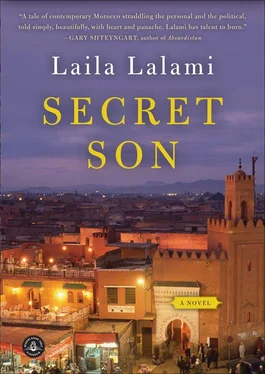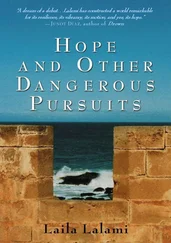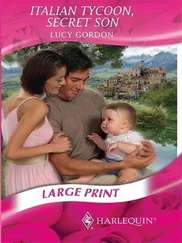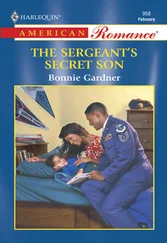“I had breakfast.”
“Oh,” Nabil said, consulting his watch. “I don’t normally eat here, that’s why the maid doesn’t cook. I will talk to her about it. Why don’t we order you something for lunch?” He took out restaurant menus from a drawer in the kitchen, picking a place called Dina’s Diner. He unfolded the menu and held it up between them. The questions pressed themselves against Youssef’s lips, begging to come out: Where do you live? Why didn’t you have other children besides Amal — and me? What about your wife? Does she know about my mother? What do you want with me? And, most important, this: Do you think, maybe, someday, you might love me?
Instead, the first question that tumbled out of Youssef’s mouth was, “Do you like hamburgers?”
“I’m not very hungry,” Nabil said. “I just thought you might like this restaurant. It’s popular with young people,” he said. “But yes, I do like hamburgers.” He tapped one line on the menu with his finger. “Try this one,” he said. “My daughter always orders it when we go there for lunch.”
“Amal?”
Nabil’s eyes looked darker, as though a cloud had moved in to block the light. “Yes.”
“Does she go to school around here?”
“No. She studies business in the U.S.” Here, Nabil seemed unable to suppress a smile. “At UCLA.”
All morning, as he had sat alone in the apartment, thinking about his father, Youssef had told himself that he should try not to look back on the past and should focus on the future instead. Yet already he could not help feeling a touch of envy upon hearing about his sister’s studies at UCLA. This was what people like the Amranis did: they studied in private schools, went to university in France or Canada or the United States, and then came back to run the country, while the rest of the people got by on fifteen hundred dirhams a month. Youssef had heard a rumor that one of the government ministers smoked Cuban cigars that each cost that much — and he was never seen on TV without one.
“You said you were not speaking to her?” he asked.
“It’s a long story,” Nabil said. He cleared his throat. Then, in a low voice, he explained, “She disrespected me.”
What exactly did this mean? Youssef could guess, though, that it had something to do with a boyfriend. What a foolish girl, he thought. Why had she not been more discreet? Suddenly he felt a surge of affection for her, for the outcast she had turned out to be. “Is she coming home this summer?” he asked.
“No.”
The expression on Nabil’s face made it clear that Youssef would not have gotten to meet her even if she was. Give it time, Youssef told himself, give it time. If she did not come to Casablanca for this summer vacation, she would be here for the New Year, and he would ask to meet her then.
“Shall we order?” Nabil asked, picking up the phone.
Youssef chose the hamburger his father had suggested.
When the food arrived, they sat across from each other in the dining room. Youssef bit into the hamburger and discovered that it was smothered in blue cheese. The mere sight of the mold disgusted him. Still, he forced himself to eat it.
“How does your mother feel about your moving into the apartment?” Nabil asked.
Youssef told him what had happened.
Nabil let his chin rest on his hand and then drew a long breath. “I have to tell you, I’m not surprised. Your mother does things her own way.”
“What do you mean?”
“She’s just … one of a kind.”
In his wallet, Youssef had a silver khamsa his mother had made him carry for years, hoping, in an uncharacteristically superstitious way, that the talisman would protect him from the evil eye. It was the only memento he had of her.
“You need to be patient,” Nabil continued. “Your mother will come around eventually.”
Youssef could not imagine what it would take for his mother to accept that he wanted to be with his father and with her. She was so sure she was right. Time alone would not be enough to make her see she was wrong.
Nabil got up to leave, saying he would be back tomorrow at lunchtime and maybe then they could spend the afternoon together. He handed Youssef some money and told him he would make all the arrangements. Youssef was not sure what arrangements were meant, but he was afraid to ask. He closed the door behind his father, feeling nauseous. By the time he walked back to his bedroom, he had to rush to the bathroom to throw up.

In the Introduction to Linguistics class, Dr. Rafik was explaining the difference between phonemes and allophones (“think of allophones as speech sounds that belong, together, to a single phoneme”), but all Youssef could think of was his father. He felt trapped inside the classroom, while life — as unpredictable and frightening as it was — was happening outside, in the city. In his African literature class, he would normally have participated in the discussion of Season of Migration to the North , but he couldn’t help checking his watch. At last it was time for a break. He stepped out to smoke a cigarette and found Amin waiting for him in the inner courtyard.
“How are you, my friend?” Amin asked, getting up to shake hands. “I stopped by the house twice, but you weren’t there.”
“I was at my father’s apartment.”
Amin whistled. “Really? What’s it like?”
They sat down together on a bench, under competing banners, one promoting an upcoming conference about the work of Mohamed Choukri (OUR NATIONAL TREASURE), and the other calling for a boycott ( AL KHUBZ AL HAFI HAS NO PLACE IN OUR MUSLIM SOCIETY). On the ground were strips of eucalyptus bark and shriveled hibiscus flowers. Youssef drew his breath, wondering whether he should describe the more obvious comforts of the place or the details that made it seem like a personal refuge for his father — the antique cigar cabinet, the dog-eared copies of Souffles , the collection of commedia dell’arte masks that lined the hallway. “It’s very nice,” he said, opening his hands. “I don’t know.”
“Are we going to see it sometime?”
He picked up a strip of bark and twirled it in his hand. “Of course. We can go there now, if you like.”
THE MAID, A MIDDLE-AGED woman who quickly averted her eyes whenever Youssef looked at her, was sorting through several bags of groceries when they walked in. “What would you like me to cook, Sidi Youssef?” she asked. Just like that. Not “Youssef,” not “son,” not “you,” but “Sidi Youssef.” No one had ever spoken to him this way before; he was not sure what to say. He glanced at Amin and then shrugged and said she could make whatever she preferred.
“You have a maid?” Amin asked, once they were in the living room.
“I didn’t know she’d be here.” Youssef heard her opening and closing drawers as she prepared the meal. He did not even know her name.
“So he gave this to you?”
“He gave me a key.”
“Is your mother going to move in?”
“No.”
Amin didn’t seem to have heard the answer. He was rummaging through the DVD collection. “There’s at least five thousand Dirhams’ worth here,” he said. “Maybe more.”
“Do you want to watch something?” Youssef offered.
They sat on the sofa, feet tucked under them, and watched an action film together. The maid brought a tea tray without Youssef’s having asked for it. Amin drank three glasses in a row, making loud sipping noises. “You know,” he said, “I could bring Soraya here.”
“She’s letting you …?”
Amin nodded.
Youssef whistled. “Just be careful,” he said, unable to explain why he worried about the girl, about what would happen to her if she were to get pregnant. Surely, Amin was smart enough to use protection.
Читать дальше













